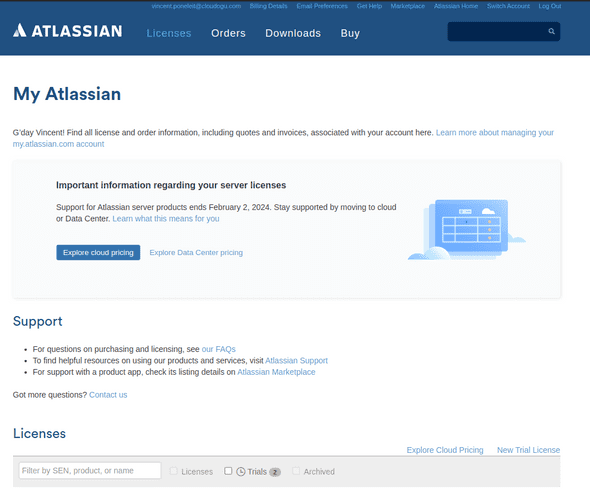Developing the Confluence dogu
Make sure that proper ldap-mapper values are set before confluence is going to be installed or built.
etcdctl set /config/ldap-mapper/backend/type embedded
etcdctl set /config/ldap-mapper/backend/host ldap
etcdctl set /config/ldap-mapper/backend/port 389Build confluence inside a running CES instance by changing into this repository. Call then cesapp to install/upgrade and start the confluence dogu:
cd /your/workspace/confluence
cesapp build .
cesapp start confluenceGeneration and deposit of a developer license
- Go to https://my.atlassian.com/products/
- Create an Atlassian account with your company Google Account
- Log in
- go to the bottom of the page and click on
New Trial License
-
Then select on the page https://my.atlassian.com/license/evaluation
Product: ConfluenceLicense type: Confluence (Data Center)Organization: Cloudogu GmbHYour instance is: up and runningServer ID: BLDL-90OD-7WFG-F9D1Generate License
- Then you will be redirected back to https://my.atlassian.com/products/
- At the bottom of the table titled
Licensesyou will find your newly generated license - Copy your license to the clipboard
- Visit https://192.168.56.2/confluence/admin/license.action
- Now paste your license from the clipboard into the displayed input field
- Go to your local CES environment via cli and execute
docker restart confluence. - After that you should be able to set up the dogu
Shell testing
You can create and amend bash tests in the batsTests directory. The make target unit-test-shell will support you with a generalized bash test environment.
make unit-test-shellIn order to write testable shell scripts these aspects should be respected:
General structure of scripts-under-test
It is rather uncommon to run a scripts-under-test like startup.sh all on its own. Effective unit testing will most probably turn into a nightmare if no proper script structure is put in place. Because these scripts source each other AND execute code everything must be set up beforehand: global variables, mocks of every single binary being called... and so on. In the end, the tests would reside on an end-to-end test level rather than a unit test level.
The good news is that testing single functions is possible with these little parts:
- Use sourcing execution guards
- Run binaries and logic code only inside functions
- Source with (dynamic yet fixed-up) environment variables
Use sourcing execution guards
Make sourcing possible with sourcing execution guards. like this:
# yourscript.sh
function runTheThing() {
echo "hello world"
}
if [[ "${BASH_SOURCE[0]}" == "${0}" ]]; then
runTheThing
fiThe if-condition below will be executed if the script is executed by calling via the shell but not when sourced:
$ ./yourscript.sh
hello world
$ source yourscript.sh
$ runTheThing
hello world
$Execution guards work also with parameters:
# yourscript.sh
function runTheThing() {
echo "${1} ${2}"
}
if [[ "${BASH_SOURCE[0]}" == "${0}" ]]; then
runTheThingWithParameters "$@"
fiNote the proper argument passing with "$@" which allows for arguments that contain whitespace and such.
sourcingExitCode=0
# shellcheck disable=SC1090
source "${STARTUP_DIR}"/util.sh || sourcingExitCode=$?
if [[ ${sourcingExitCode} -ne 0 ]]; then
echo "ERROR: An error occurred while sourcing /util.sh."
fiRun binaries and logic code only inside functions
Environment variables and constants are okay, but once logic runs outside a function it will be executed during script sourcing.
Source with (dynamic yet fixed-up) environment variables
Shellcheck basically says this is a no-no. Anyhow unless the test container allows for appropriate script paths there is hardly a way around it:
sourcingExitCode=0
# shellcheck disable=SC1090
source "${STARTUP_DIR}"/util.sh || sourcingExitCode=$?
if [[ ${sourcingExitCode} -ne 0 ]]; then
echo "ERROR: An error occurred while sourcing /util.sh."
fiAt least make sure that the variables are properly set into the production (f. i. Dockerfile)and test environment (set-up an env var in your test).